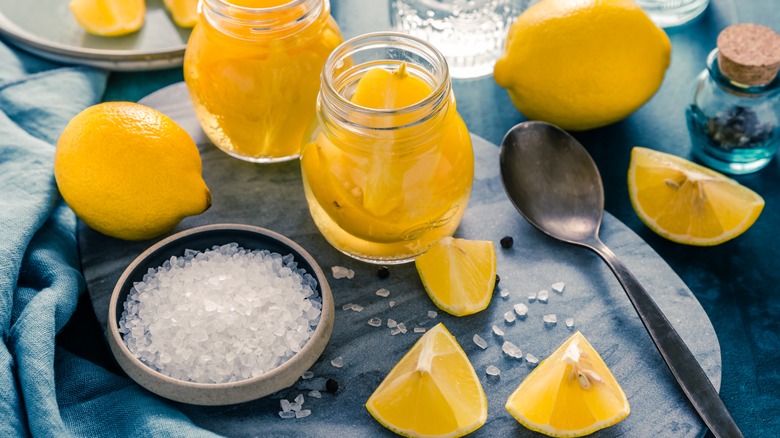Alton Brown's Secret Ingredient To Give Lemonade A Major Upgrade
Alton Brown is known for approaching the art of cooking with a scientific mind. Combining food science and experimentation with history, pop culture, and humor, the host of "Good Eats" has always captured his viewers' imaginations and piqued their intellectual curiosity with his different and quirky take on cooking shows. Is it any wonder that Brown would set out to improve something as basic, beloved, and iconic as lemonade? Absolutely not. As simple and delicious as lemonade is (it's just lemons, sugar, and water), it's Alton's job to tinker, usually with amazing results. The man can always find a better way.
Lemonade as we know it can be traced back to 17th century Paris, according to How Stuff Works. Vendors sold the refreshment in the streets by strapping tanks filled with sparkling water, lemon juice, and honey to their backs. In the 18th century, European immigrants brought different versions of lemonade to the United States, where traveling circuses and ice technology played a part in securing lemonade's spot in American culture. The temperance movement and later, prohibition, helped to increase the popularity of this wholesome drink. Of course, the lemonade stands of the 20th century are a rite of passage and a happy memory for many American kids.
So, Alton Brown thinks he can improve lemonade? Will he hoist a tank and pass it out in the streets à la the Parisians? No, but we like that idea and could honestly see Alton doing this for "Good Eats."
Preserve some lemons
Alton Brown set out to improve an already great drink: lemonade. His method? Swapping out fresh lemons for preserved ones, as he revealed in his cookbook: "EveryDayCook" (via Showbiz CheatSheet) and on the Alton Brown website.
While basic lemonade (lemons, sugar, and water) is delicious, beyond its tart and sweet qualities, there's not much depth to the concoction. Adding preserved lemons, however, adds an extra dimension. According to Bon Appétit, preserved lemons taste, well, extra. Extra lemony, extra tangy, and extra acidic. Plus, they have salinity, which you won't find in fresh lemons. You can buy preserved lemons or make them by adding whole or cut-up fresh lemons into a salt and water mixture or lemon juice to pickle them. The process takes two weeks, according to Bon Appétit. But leave it to Alton Brown to figure out a way to preserve them in just eight days.
For his lemonade, Brown starts by cooking up a lemon syrup from preserved lemons, water, sugar, and lemon juice. The rinds soften in the brine so they break down easily when heated). To serve, Brown drizzles some syrup over ice and tops it with soda water for some sparkle. As for salt in your lemonade? Don't worry, it actually counters the sweetness in a way that gives this classic refreshment some complexity. We'll definitely be upgrading our lemonade this summer.

